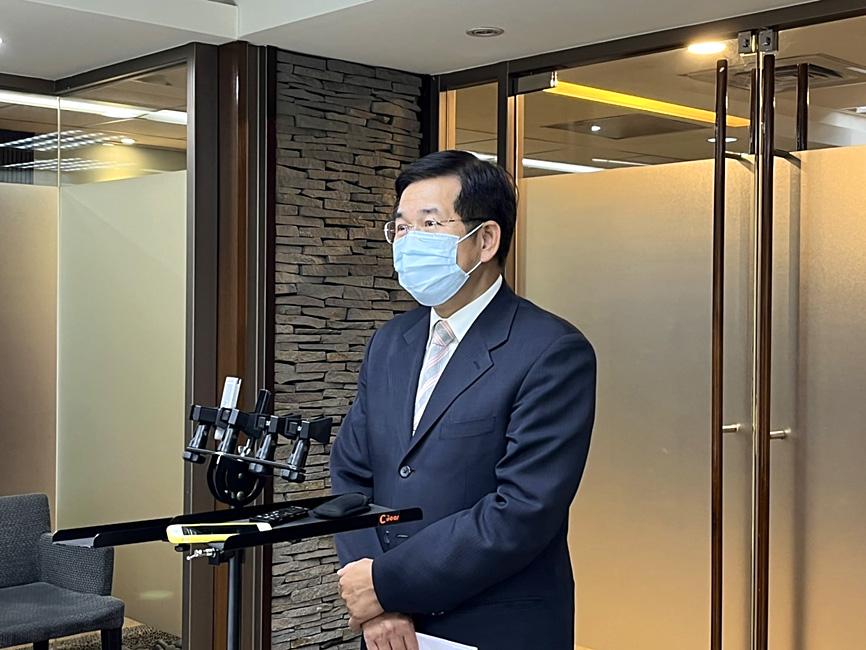Education officials are considering reopening Taiwan to 5,000 additional foreign Mandarin-language students by March as the local COVID-19 situation shows signs of easing, Minister of Education Pan Wen-chung (潘文忠) said yesterday.
The visa expansion would apply to non-scholarship and non-degree international students, including those enrolling in six-month programs or at Mandarin learning centers, he told a news conference at the ministry in Taipei.
The proposal would soon be submitted to the Central Epidemic Command Center (CECC) for approval, he said.

Photo: Wu Po-hsuan, Taipei Times
Since Taiwan partially reopened its borders in August, schools have enrolled 13,000 international students and another 1,000 are expected to arrive soon, he said.
While a few foreign students tested positive for COVID-19 after arriving, strict quarantine procedures had them diagnosed and treated before they arrived at their schools, he said.
Pang’s remarks came a day after Democratic Progressive Party (DPP) lawmakers urged the government to let more Mandarin learning center students enter Taiwan.
Speaking to reporters at the Legislative Yuan, legislators Chiu Chih-wei (邱志偉) and Hsu Chih-chieh (許智傑) said that enrollment at the centers is below a sustainable level due to the COVID-19 pandemic, and told the ministry to propose a solution before the end of the month.
Non-scholarship international students studying Mandarin are the main source of enrollment for language centers, but such students have been largely left out of the ministry’s plans, Chiu said, citing ministry data from August.
The Mandarin learning centers reported 16,802 students this year, down from 32,457 in 2019, while the CECC has told lawmakers that no visas would be issued to non-scholarship students before Feb. 12, he said.
“Using scholarships as the standard for who can enter makes no sense,” he said. “Student entry should be based on vaccination status, the COVID-19 situation in their country and the strength of quarantine protocols — like the entry rules for guest workers,” he said.
Exporting culture via language education is a critical part of Taiwanese diplomacy and the Ministry of Education should appreciate that the Mandarin education industry is a national strategic asset, he said.
Taiwan should not waste the opportunity granted by a backlash against dubious practices at Beijing’s Confucius Institutes to challenge China’s control of the global Mandarin education market, Hsu said.
The demand for Mandarin education is strong and cultivating the market would be beneficial to Taiwan for years to come, he added.
Responding to media queries, Department of International and Cross-strait Education Director Lee Yen-yi (李彥儀) said that the ministry would work with the CECC to increase the influx of international students, as the legislators recommended.
The ministry would need to set conditions based on the enrollment capacity of the centers, the students’ quality, and the effectiveness of disease prevention measures at home and abroad to maintain safety and order, she said.
Education officials are to discuss the measures with the CECC and announce a proposal in one month, she said.

MAKING WAVES: China’s maritime militia could become a nontraditional threat in war, clogging up shipping lanes to prevent US or Japanese intervention, a report said About 1,900 Chinese ships flying flags of convenience and fishing vessels that participated in China’s military exercises around Taiwan last month and in January have been listed for monitoring, Coast Guard Administration (CGA) Deputy Director-General Hsieh Ching-chin (謝慶欽) said yesterday. Following amendments to the Commercial Port Act (商港法) and the Law of Ships (船舶法) last month, the CGA can designate possible berthing areas or deny ports of call for vessels suspected of loitering around areas where undersea cables can be accessed, Oceans Affairs Council Minister Kuan Bi-ling (管碧玲) said. The list of suspected ships, originally 300, had risen to about 1,900 as

DAREDEVIL: Honnold said it had always been a dream of his to climb Taipei 101, while a Netflix producer said the skyscraper was ‘a real icon of this country’ US climber Alex Honnold yesterday took on Taiwan’s tallest building, becoming the first person to scale Taipei 101 without a rope, harness or safety net. Hundreds of spectators gathered at the base of the 101-story skyscraper to watch Honnold, 40, embark on his daredevil feat, which was also broadcast live on Netflix. Dressed in a red T-shirt and yellow custom-made climbing shoes, Honnold swiftly moved up the southeast face of the glass and steel building. At one point, he stepped onto a platform midway up to wave down at fans and onlookers who were taking photos. People watching from inside

Japan’s strategic alliance with the US would collapse if Tokyo were to turn away from a conflict in Taiwan, Japanese Prime Minister Sanae Takaichi said yesterday, but distanced herself from previous comments that suggested a possible military response in such an event. Takaichi expressed her latest views on a nationally broadcast TV program late on Monday, where an opposition party leader criticized her for igniting tensions with China with the earlier remarks. Ties between Japan and China have sunk to the worst level in years after Takaichi said in November that a hypothetical Chinese attack on Taiwan could bring about a Japanese

The WHO ignored early COVID-19 warnings from Taiwan, US Deputy Secretary of Health and Human Services Jim O’Neill said on Friday, as part of justification for Washington withdrawing from the global health body. US Secretary of State Marco Rubio on Thursday said that the US was pulling out of the UN agency, as it failed to fulfill its responsibilities during the COVID-19 pandemic. The WHO “ignored early COVID warnings from Taiwan in 2019 by pretending Taiwan did not exist, O’Neill wrote on X on Friday, Taiwan time. “It ignored rigorous science and promoted lockdowns.” The US will “continue international coordination on infectious